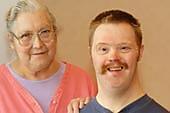What Causes Treachers Collins Syndrome?
Treacher-Collins syndrome is a hereditary condition that causes facial defects. Another name for this is Mandibulofacial dysostosis
Treacher-Collins syndrome is caused by a defective protein called treacle. The condition is inherited as an autosomal dominant trait. In about 60 per cent of cases there’s no family history and the condition is due to a new mutation of the gene. In such cases, there’s only a tiny chance that a second child with the condition will be born to the parents, but the affected child may pass the syndrome on to their own children.
Recent research has pinpointed the cause of Treacher Collins syndrome as a problem with a gene on chromosome 5.
This gene controls development of the bones and other structures of the head and neck. When the gene is faulty, the facial bones don’t develop as they should in the womb and a baby is born with characteristic facial features. The extent of these abnormalities varies from person to person, but they often cause problems with hearing, breathing and eating.
Although most children with Treacher Collins syndrome pass developmental milestones, such as starting to walk and talk, at the usual time and are of normal intelligence, hearing problems can interfere with learning. Many need help such as specialized hearing aids or speech therapy to develop speech and language.
About one in every 10,000 babies is born with Treacher Collins syndrome. The condition is dominantly inherited, which means an affected person has a 50 per cent chance of passing it on to their offspring. Many affected people can trace the condition back through their parents and grandparents. However, children who are severely affected may have a parent who is only mildly affected and vice versa, so the condition may have gone unrecognized.
As a genetic condition, Treacher Collins syndrome can’t be cured. However, most people are able to lead completely normal lives, although many need help to cope with a variety of practical problems.
A tracheostomy (a hole into the trachea through the front of the neck) may be needed to help breathing, while reconstructive surgery may be necessary to correct a cleft palate. A notch, or coloboma, in the lower eyelid may cause the eyes to dry out easily, increasing the risk of infection. This may require surgery.
Reconstructive surgery may also be offered to build up the cheekbones, correct the nose or an underdeveloped jaw (which may help to improve breathing) or reconstruct the outer ear.
Overcrowded teeth or malocclusion of the bite (where teeth don’t meet each other as they should) may require dental work.
Additional Reading on Treacher Collins Syndrome:






